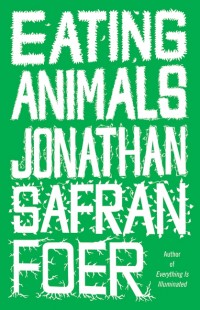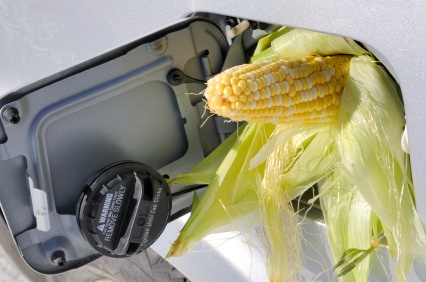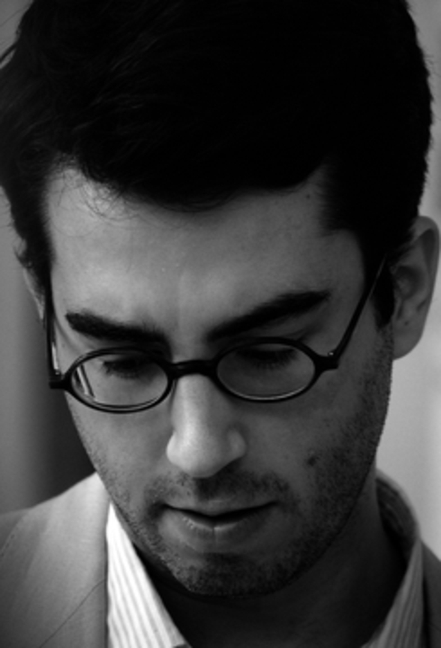 If you’re a meat eater, don’t read Jonathan Safran Foer’s new book Eating Animals. Unless, that is, you are a meat eater curious about the health of your body, the planet, or the animals you consume.
If you’re a meat eater, don’t read Jonathan Safran Foer’s new book Eating Animals. Unless, that is, you are a meat eater curious about the health of your body, the planet, or the animals you consume.
The acclaimed author of Everything is Illuminated and Extremely Loud and Incredibly Close, Foer, has been an on-again, off-again vegetarian since age nine when his herbivore babysitter explained to him why she wasn’t eating chicken.
Years later, as a first-time father-to-be, Foer set out on a three year journey to learn where the meat that we eat comes from. The result is Eating Animals.
But Foer isn’t the only one doing the talking. An animal activist and factory farmer have monologues, along with a vegan who builds slaughterhouses and a vegetarian rancher, among others. Then he weaves their stories into his own philosophical ponderings about the morality of supporting an industry that has produced some sickening statistics of late.
But wherever you fall on this issue — staunch meatetarian, longtime vegan, or back and forth vegetarian like Foer himself — you won’t look at the meat industry in the same way again — and you might even find yourself advocating for changes.
Foer talked with Grist about his book, why environmentalists haven’t done enough to address meat, and his Thanksgiving dinner.
———-
Q. Some people might look at your book and think, it’s just some vegetarian trying to tell me to not eat meat or preach to me. How would you describe your book to someone skeptical about reading it?
 Jonathan Safran FoerPhoto: Gianluca GentiliniA. There are things in it that people really want to know. I, of course, understand the impulse not to want to look, because I had that impulse many times a day with all kinds of issues. If something comes on the TV about starving kids and I think, “oh god I don’t want to look because I’m not doing what I maybe should be doing.” You know all of the reasons why we can’t face certain things. I’ve heard from a lot of people who’ve read the book who frankly don’t care that much about animals, but for whom the human health stuff was just really shocking. I’ve talked to a fair number of parents who said I don’t want to feed my kids this stuff. Unfortunately, conversations about meat have historically not really been conversations but arguments. You know my book. I have strong opinions and I share them but I don’t think of my book as an argument. I think of it as a kind of story that I’m telling — about my life, the decisions I’ve made, why having a kid changed my mind about some of these things — but also a conversation. Many many people have their own voice in the book — farmers, activists, nutritionists — and I wanted it to capture what a complicated and also what a first-person oriented topic meat is.
Jonathan Safran FoerPhoto: Gianluca GentiliniA. There are things in it that people really want to know. I, of course, understand the impulse not to want to look, because I had that impulse many times a day with all kinds of issues. If something comes on the TV about starving kids and I think, “oh god I don’t want to look because I’m not doing what I maybe should be doing.” You know all of the reasons why we can’t face certain things. I’ve heard from a lot of people who’ve read the book who frankly don’t care that much about animals, but for whom the human health stuff was just really shocking. I’ve talked to a fair number of parents who said I don’t want to feed my kids this stuff. Unfortunately, conversations about meat have historically not really been conversations but arguments. You know my book. I have strong opinions and I share them but I don’t think of my book as an argument. I think of it as a kind of story that I’m telling — about my life, the decisions I’ve made, why having a kid changed my mind about some of these things — but also a conversation. Many many people have their own voice in the book — farmers, activists, nutritionists — and I wanted it to capture what a complicated and also what a first-person oriented topic meat is.
Q. You make a powerful moral argument against eating meat. With so many other moral injustices and inequalities in the industrial food system, why did you focus solely on meat?
A. A number of reasons. One, it would take many, many books to write about the entire food system in a way that it deserves, comprehensively. I had to leave so much out just in my conversation of meat in the interest of having a book that could be useful, readable. So yes, there are many injustices in the world. This is a special one. In the food system, [meat] is unique because the food is sentient where carrots aren’t and corn isn’t. [Meat] also happens to be the worst part of the food system when we talk about the environment and the worst part when we talk about human health. It deserves special attention.
Q. Did you see a lack of conversation about the meat industry, especially when we talk about the food system? Did you see a lack of information there for people?
A. Definitely. I think every book is written because the author wants to read it, whether it’s a novel or nonfiction. And as somebody who has thought about this issue for a long time, there was a certain kind of thing I wanted to read. And it didn’t exist. Omnivore’s Dilemma sort of approaches some of this but doesn’t get into it. And the same could be said of Fast Food Nation. And then there are books that are, of course, very directly about meat but they tend to be more rigidly philosophical rather than, as I said before, a conversation or a story. If such a thing had existed, man oh man, I would have been so happy not to work on this. I really like writing novels. This felt important.
Q. Food has such a strong sentimental value. You talk about your grandma’s chicken and carrot dish in the book. Do you think this is the reason people and our society in general tend to ignore discussion about where meat comes from?
A. There are many, many reasons. One, it’s just unpleasant to think about and talk about. Two, yes these emotional, psychological personal history reasons. Three, it tastes good and it smells good and most people want to continue to do things that feel good to them. But four, there are many forces that suppress a good conversation about this. It’s impossible to go to the kinds of farms that produce 99 percent of the meat in America. There’s labeling, very manipulative labeling, that discourages us from having a conversation because it makes us feel that things are more okay than they actually are. But I think it’s a conversation that people are not only willing to have, but want to have. We don’t want to eat foods that aren’t good for us. We don’t want to eat foods where environmental destruction is built into the business model. We don’t want to eat foods that require animal suffering, require insane kinds of modifications to animals’ bodies. These are not liberal or conservative values. Nobody wants this.
Q. When I first considered becoming a vegetarian, I kind of freaked out and thought, “This is going to change my life by not eating meat! I’m going to have to make a lot of changes.” How can someone who is considering becoming a vegetarian overcome that hurdle?
A. I would say don’t think about it as becoming a vegetarian. Think about it as a process of eating less meat. And maybe the process will end with eating no meat. But if Americans lose one serving of meat a week from their diet it would be like taking about 5 million cars off the road. That’s a really impressive statistic that I think might motivate a lot of people who feel they can’t become vegetarians to remove one serving of meat. So, we need to move away from this kind of dichotomous, absolutist language and towards something that just reflects where people are in this country. Once people start caring they care about more, not less.
Q. You’re very honest about your struggle to stick to a vegetarian diet. Was that your purpose, with talking about that in the book, going back and forth in your struggle?
A. It was just the truth. And that truth can be really helpful because again a lot of people get turned off by the prospect of some sort of an absolute end they think they’re not going to be capable of achieving. If the conversation were just more flexible. Of course certain things are wrong. They’re just wrong, wrong, wrong. There’s no way around it. But the goals that most people who care about this issue have are reducing animal suffering and having a food system that is respectful of the environment. If those are really our goals, then we should have an approach that better reflects that.
Q. You focus a lot on personal choice when it comes to eating meat — the moral dilemma between choosing to eat meat and to not eat meat. What about government policy? If the government regulated the meat industry more strictly, wouldn’t change happen more quickly? Is personal choice enough and where does activism come into play?
A. Well, it’s all part of a picture. The government is going to lag behind everybody else because they have to endorse American industry and 99 percent of American industry is factory farming. There have been some very successful referendums around the country. Like, California’s Prop 2 is the most famous one and also the threats of referendums which have encouraged certain states like Michigan to make changes on its own. So those are really effective and we’re going to see a lot more of them.
Q. One of the reasons you wrote this book was to become an informed parent. The food industry in general, not just Big Meat, spends a lot of money on advertisements aimed at children. How do you protect your son from influential food advertising, especially from the meat industry?
A. Well, it’s a non issue so far. But, we’ll have conversations, not just pretend that there isn’t an issue. We’ll talk about it. He might reach different conclusions. He might want to try certain things. Of course he will, if he’s at all like every other kid who has ever lived. We also need to get this crap out of schools. Definitely we need to get posters from lobbying organizations, profit driven lobbying organizations out of schools, whose incentive is not to make our kids healthier. But, we also need to reform the school lunch program. It shouldn’t be depository for all the meats, the factory farmed products, that America isn’t buying. And we spend five times as much on factory farmed products than we do fruits and vegetables in high schools.
Q. Explaining how factory farms work would be enough to give anybody nightmares. How are you going to approach that with your son?
A. Well, it only gives you a nightmare if you’re participating. To say no to it lets you sleep at night.
Q. You discussed the link between factory farms and large pandemics, Spanish influenza, swine flu. The mainstream media is always talking about swine flu. Why do you think they shy away from linking factory farms and H1N1?
A. I don’t know. You tell me. I mean, we could assume there’s some pressure from the meat lobby I guess, the pork lobby, but I don’t really know. I find it very strange.
Q. You write in your book, “someone who regularly eats factory farmed animal products cannot call themselves an environmentalist without divorcing that word from its meaning.” Do you think environmentalists have done enough to make the connection between meat production and climate change? And what more do you think could be done?
A. No, they obviously haven’t [done enough], and they know it’s the elephant in the room. They haven’t because they fear that addressing it is going to risk losing people. And I appreciate that. I don’t think that that’s stupid. I’m not one to get on Al Gore’s back for not talking about it enough because he’s doing amazing work and he serves a function in the world and it might very well be that if he got too deeply into this issue people would treat him, and the cause perhaps, less seriously. That having been said, we have to get serious. This is the number one cause of global warming — and not by a little bit but by a lot. The most recently revised estimate was that animal agriculture is responsible for 51 percent of greenhouse gas emissions, so that’s more than everything else put together. If we’re going to seriously think about this stuff we might have to risk the discomfort.
Q. Are you going to eat tofurky for Thanksgiving dinner this year? [Note: This interview took place the week before Thanksgiving.]
A. No. I don’t really get into the whole tofurky business. We’re going to just have really the kinds of food that everybody has — just no turkey. We’ll have stuffing and green beans and sweet potatoes and yams and all of that stuff. I guarantee everyone will go home full. I’m really looking forward to it actually this year.



